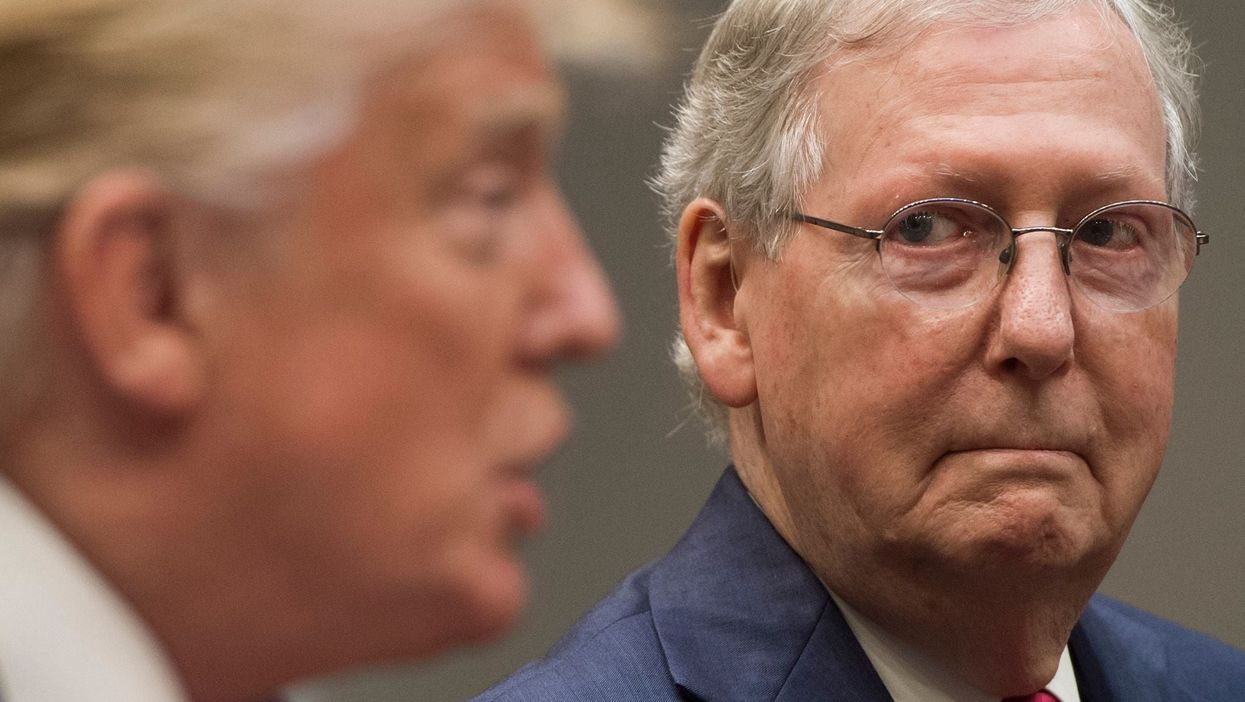Joanna Taylor
Feb 17, 2021

SAUL LOEB/AFP via Getty Images
Trump has engaged in a bitter feud with top Republican Mitch McConnell.
The former president described his long-time ally as a “third-rate leader” and an “unsmiling political hack” in his first statement since being acquitted at his impeachment trial.
McConnell, in turn, accused Trump of bearing “moral responsibility” for the Capitol riot and of shouting “unhinged falsehoods” from the “world’s largest megaphone”.
As Senate majority leader, McConnell supported Trump throughout his years in office, helping him to push legislation through Congress. So how did their relationship finally sour?
The answer may lie in its cool beginnings.
In 2016, when Trump was running for Republican nominee, McConnell was critical of the upstart presidential candidate. Reflecting on Trump’s televised debates, he told Bloomburg that “it’s pretty obvious he doesn’t know about the issues” and bemoaned his lack of prepared script.
He also condemned Trump’s “inappropriate” comments after he claimed the judge presiding over a case brought against Trump University had a conflict of interest because of his Mexican heritage.
Despite this, McConnell endorsed Trump after it became clear that he would become the Republican Party nominee. A partnership of convenience was formed, and it was one that McConnell thought he could control.
The Senate leader told CNBC that Trump “isn’t going to change the platform of the Republican Party” and that they would, in fact, likely change him because “if he is president, he’s going to have to deal with the right-of-centre world, which is where most of us are”.
Clearly, this wasn’t actually to be the case. Trump filled the White House with MAGA supporters and immediately began to rule by executive order, tearing up Obama-era legislation relating to healthcare and the environment and enacting the so-called “Muslim ban” in his first month in office.
But McConnell backed Trump regardless in the years that followed, and in more ways than simply helping to pass his legislation through the Senate.
He helped to prolong Trump’s government shutdown – the longest in US history – as the president staked out Congress after they refused to fork out $5bn for his border wall. He also helped to acquit Trump after his first impeachment trial by arguing against letting witnesses take the stand.
In both of these cases, McConnell stood by Trump, even in spite of his self-described centrism and institutionalism. Why he should do this – and why he should begin to turn his back on Trump now – is obviously because of power.
McConnell backed Trump unfailingly while he was at the top: now that he’s not, there’s no such need. They were never particularly politically aligned, but McConnell knew he had to play the “long game”, according to a former administration official quoted in The New Yorker.
“Trump is about winning the day, or even the hour. McConnell plays the long game. He’s sensitive to the political realities. His North Star is continuing as Majority Leader—it’s really the only thing for him,” they said.
It follows, then, that McConnell would criticise Trump in the wake of the Capitol riot — and his loss of the presidential election. It also follows that he would oppose his impeachment and stop short of condemning him entirely: MAGA politics remain popular among some Republican politicians and voters, including in his home state of Georgia.
This was something Trump alluded to in his tirade against McConnell. He said, “McConnell begged for my strong support and endorsement before the great people of Kentucky in the 2020 election and I have it to him. He went from one point down to 20 points up, and won.
“How quickly he forgets. Without my endorsement, McConnell would have lost, and lost badly.”
Already, McConnell appears to be struggling to rule over both sides of an increasingly split Republican Party. A small group of House Republicans, led by Liz Cheney, voted to impeach Trump, against McConnell’s will — and now Trump has openly attacked him.
His future in the Party might not be as secure as he might think.
That Trump would feud with McConnell should come as no surprise. There is no one the former president won’t lash out against, whether that be the litany of advisers and directors he fired while in office or — in one final, desperate attempt to cling to power — his own vice president.
Top 100
The Conversation (0)













